- President’s Message
- What is the JFBA?
- Organization
- Our Officers
- JFBA Rules and Regulations
- JFBA brochure
- Access to Bar Associations Building
- Mission Statement
- Protection of Human Rights
- Reform of the Judicial System
- Reform of the Criminal Justice System

Training of Legal Professionals
- Expanding the Scope of Attorneys’ Activities
- Elimination of Shortages/Uneven Distribution of Attorneys
- Support Activities to Remedy the Violation of Rights
- Legal Aid/Assistance Projects
- International Activities
- Our activities relating to Business and Human Rights
- Major Meetings/Events
- The Japanese Judicial System
- The Japanese Attorney System
- Information for Registered foreign lawyer
- Duties of the Japan Legal Support Center and the JFBA
- Justice System Reform
- Publications
Previously in Japan, it was necessary for anyone who intended to be a legal professional such as an attorney, judge, or prosecutor, to pass the bar examination, complete legal training at the Legal Research and Training Institute, and pass the final examination.
The selection of candidates only through the one-time bar exam caused various negative consequences. In this context, the Recommendations of the Justice System Reform Council issued in 2001 suggested a drastic reform of the legal professional education system, featuring a "training process" which organically coordinates legal education, the bar examination, and judicial training.
In April 2004, the new legal professional training system started in which law schools, established as professional graduate schools, play a central role. At law schools, many practicing lawyers teach students as instructors and train them to become their successors.
Many new legal professionals have started their career under the new legal training system and are actively engaging in their work in various fields. However, some problems have arisen, such as low passage rate of the bar exam, financial hardship or difficulty in time management during the legal training process,* and a decrease in the number of applicants seeking to become legal professionals.
In order to solve these problems, the government and relevant ministries have established various taskforce committees and discussed reform plans. The JFBA will continue to actively participate in these discussions and focus on reforming the legal training system.
*After World War II, legal apprentices were entitled to salaries from the national treasury during the term of legal training. However in 2011, the salary system was replaced by a loan system. Since then the JFBA has been conducting various activities in its efforts to establish a grant-type financial support for legal apprentices in order to ensure that no one gives up his or her ambition to become a legal professional simply due to financial reasons and that judicial apprentices are able to focus on their apprenticeship without having to worry about financial issues. As a result of such activities, the government introduced in 2017 a new grant-type financial support to apprentices in addition to the existing loan system.

- About our site(in Japanese)
- Privacy Policy
Legal Education Issues Loom in US and Japan
- Share article on Facebook
- Share article on Twitter
- Share article on LinkedIn
- Email article
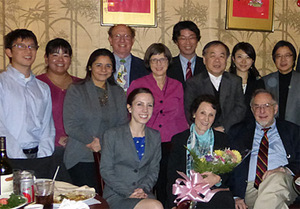
By Andrew Cohen
At a time when many countries are scrutinizing the role of legal education, Berkeley Law and one of its global partners convened to discuss emerging issues in the United States and Japan. The December 2013 Sho Sato Conference built on a longtime collaboration between the law school’s Sho Sato Program in Japanese and U.S. Law and Waseda University’s Institute of Clinical Legal Education in Tokyo.
The program is named in honor of the late Sho Sato, a distinguished Berkeley Law professor and prominent scholar of environmental, state, and local law.
“If you look at the problems facing legal education and the bar in both countries superficially, it looks like we’re dealing with the same challenges,” said Professor and Sho Sato Program Director Charles Weisselberg . “But when you look deeper, the differences are really profound, and I think this conference brought that out.”
Legal professionals in both nations share concerns about employment prospects for law school graduates and declining law school applications. And there are some longstanding debates between academia and the bar about how lawyers should be taught. But while many U.S. issues can be linked to the 2008 economic downturn and its impact on our legal marketplace, Japan faces more entrenched obstacles according to conference presenters.
U.S. and Japanese legal education experts shared information and—with the aid of interpreters providing translations of each presentation—offered wide-ranging suggestions.
“It’s important to understand differences in training and culture in our respective countries,” Weisselberg said. “But it’s also important to devise ways to deliver legal training and services effectively and efficiently while honoring our countries’ traditions.”
A bumpy beginning
As part of a series of reforms to its justice system, Japan opened 74 graduate professional law schools in 2004. But they are suffering a decline in applicants and a stagnant bar exam passage rate—just 26 percent. Meanwhile, legal services for rural residents, indigent clients, and small businesses remain elusive, said Japanese attorney Takuo Yamaguchi, vice chair of the Japan Federation of Bar Associations’ Center for Law Schools.
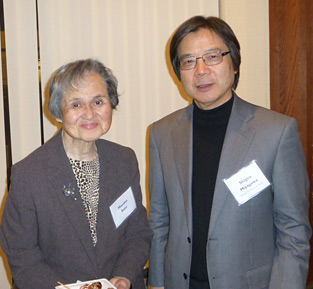
Presenters described ongoing disagreement about what lawyers’ role should be, and noted that law schools are undermined because people in Japan can take the bar exam without obtaining a law degree. Other cited roadblocks: cultural aversion to litigation, a widespread view that hiring lawyers is not cost-efficient, and related professions that handle many non-litigation tasks lawyers could provide.
“In Japan, 60 percent of lawyers work in a solo practice,” Yamaguchi said. “Many lack the capacity or experience to provide great value.” Until 1990, Japan limited its number of new lawyers each year to 500. Since then, its lawyer pool has more than doubled: from 13,800 to about 32,000. “That has created a glut,” Yamaguchi explained. “There are globalization opportunities, such as negotiating contracts with foreign companies, but Japan hasn’t emphasized cross-border transactions in its training.”
Yamaguchi decried procedural hurdles that make it onerous to use Japan’s legal system, and a murky relationship between legal education and apprenticeships. “Schools still emphasize old-fashioned subjects that are not attuned to modern-day practice,” he added, “and there isn’t enough clinic work developing practical skills.”
Bridging the gap
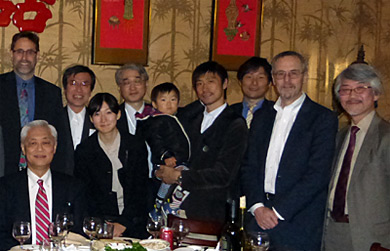
Jeff Selbin , faculty director of the East Bay Community Law Center , discussed the juxtaposition of a difficult U.S. legal job market that leaves an estimated 80 percent of the poor’s civil legal needs unmet. He explained that while one in five Americans are eligible for free legal aid, half get turned away due to a lack of resources and capacity.
“Law schools must play a crucial role in bridging these gaps,” Selbin said, noting that clinics served about 90,000 clients last year, while stoking their students’ public-interest aspirations and skills. He urged law schools to “prioritize the demands of the poor, increase students’ experiential learning opportunities, expand post-graduate public interest opportunities, and partner with NGOs, bar associations, and government agencies.”
Kenji Fukuda and Sayaka Matsui—part of Waseda Law School’s first class when it opened in 2004—described their own gap-bridging work at the Waseda Legal Commons Law Office. Launched in March, the organization offers hands-on case experience to law school students and recent graduates.
“As the first generation of law school graduates in Japan, we feel an obligation to help our country’s new lawyers,” Fukuda said. Matsui called the nascent operation “a great opportunity to see where the law is applied and how it works in practice, while helping law students connect with legal professionals.”
Kristen Holmquist , the director of Berkeley Law’s Academic Support Program and associate director of its Professional Skills Program , described U.S. bar organizations’ push for schools to provide more practical training. State bars are considering mandating 50 or more hours of supervised pro bono experience, and the American Bar Association will likely adjust law school accreditation standards to require a minimum number of professional skills courses.
“Many law schools have already expanded their number of clinics, specialization certificates, externship opportunities, and adjunct-taught skills courses,” Holmquist said. “Experiential learning is certainly valued, but top students still gravitate to the highest-ranked schools and employers still value hiring from those schools over all other factors.”
- Bahasa Indonesia
- မြန်မာဘာသာစကား

Studying Japanese Law in Japan
The ability to practice law in the Japanese legal system has gone through interesting changes, even in the past 10 years. Some of the leading law schools in the country sought changes in its curriculum, offering flexible and internationalized programs to provide a glimpse at Japanese law itself.
Table of Contents
Japanese Legal Education and Recent Changes
Study japanese law in japan, other programs, the bar exam, and registered foreign lawyers.
Before we begin, this article is not about how to become a lawyer in Japan, but rather to provide information about Japanese law, the history of legal education and how to study about Japanese law in Japan. For those studying or working in international law, or doing business with Japanese firms, it may be worth taking a course on law in Japan.
Background of Legal Education in Japan
Legal Education in Japan changed generally over time due to its failure to produce new lawyers. The first legal education model used was based on Western legal education, specifically German, French, and American law, due to Japan's westernization at that time. This model continued to develop throughout the years and was used as Japan's legal education system up to 2004. In 2004, the government introduced a new legal education system called the Juris Doctor Program to improve Japan National Bar Exams' passing rate and produce more productive and efficient lawyers.
Recent Significant Changes
The introduction of the Juris Doctor Program, also known as the law school degree, is one of the recent changes in Japan's legal education. In the US, an aspiring lawyer must have a Juris Doctor degree before taking the National Bar Exam (NBE). Japan took notice of the program and adapted it in their current law education. Japan requires takers of the NBE to have a law school degree (similar to Juris Doctor degree) first before they can take the exam.
However, there is one way around it. The most recent change on Japan's legal education happened in 2011, where they introduced the "Yobi-Shiken" (preliminary examination) to give a chance for non-law degree holders to become a lawyer. Non-law degree holders take the Yobi-Shiken exam and must pass it before taking the NBE and continue their journey of being a lawyer.
Writer's Pick

What is Kafunsho? Surviving Hay Fever in Japan

Japan Spring Flowers: When and Where to See Them

Spring in Japan: Japan Holidays in March, April and May

A Second Home: Interview with Filipinos Living & Working in Kumamoto,...

Feeling Blue in May? You’ve Got Japan’s May Blues, Gogatsubyo

To become a lawyer in Japan, you must be fluent in Japanese and pass the Bar Exam. That in itself is a huge hurdle if you are from overseas, as you must be committed to going through law school like a native Japanese person - or take the Yobi-Shiken mentioned above before taking the Bar Exam. However, if you simply wish to learn about Japanese law in Japan to get a leg up in the international law scene, or if you wish to do business with Japanese companies, or you need to know more about Japanese law for any reason, here are some internationalized programs in English you could take:
Universities with International Programs
Kyushu university graduate school of law.
Kyushu University offers a Juris Doctor degree and a lot of masters of law degrees in different fields such as International Economic and Business Law (IEBL), Young Leaders' Program (YLP), and Project for Human Resource Development Program. Kyushu University also has a unique part of its curriculum called "theory meets practice", wherein they have different international professors from other countries visit and teach students.
Keio University Law School
Keio University offers both a Juris Doctor and a master of laws degree. Keio University offers a unique program called Master of Laws (LL.M) in Global Legal Practice conducted using the English language in Japan. It was the very first program with this concept in the country created in 2017. Keio's selling point is the prominent use of the English language in their curriculums to attract locals who want to enhance their English skills and international students who wish to study Japanese law.
Waseda University Graduate School of Law
Similar to Keio University, Waseda University also uses the English language in their curriculum. Waseda attracts a lot of international students compared to other law schools because of this. They also offer a lot of Master of Laws (LL.M) degrees such as in environmental law and intellectual property law.
Nagoya University Graduate School of Law
Nagoya University uses both English and Japanese in their curriculum. They let students choose if they want to be taught in English or in Japanese. They offer a Masters of Laws (LL.M) in comparative law to international students.

Short Term Programs Specialized for Studying Japanese Law
There are universities in Japan that offer short term programs or short summer courses that even non law students can take. These courses primarily focus on the understanding and application of Japanese Law that has both similarities and differences from western law. Meiji University offers this kind of courses and they mainly tackle contemporary issues and comparative views in Japanese law that allow students to better understand how Japanese cultures are integrated into their laws. To understand Japanese law better, Meiji University even conducts field trips for their students.
Studying American Law in Japan
If you wish to study American Law in Japan, there are some universities who specialise in teaching American Law. One example would be Temple University that has a school for American Law called Beasley School of Law. Temple University allows both locals and international students alike to earn an American Masters of Law (LL.M) degree in Japan.
※ Temple University, " Beasley School of Law at Temple University, Japan Campus American Law School in Japan "
National bar examination.
The Japanese bar examination used to be one of the most difficult bar examinations in the world with a low passing rate before they reformed it in 2004. In order to take the bar, examinees must have a Juris Doctor degree or a Law school degree and can only retake the exams up to 5 times - unless of course, one takes the Yobi-Shiken. The exam has two parts: multiple choice and essay writing. The exam is still quite difficult and 1502 people passed out of almost 5,000 exam takers in 2019.
Registered Foreign Lawyers in Japan
Corporations and organizations dealing with foreign countries need lawyers familiar or with expertise with foreign laws to help in the transaction between countries. Foreign lawyers - in other words, lawyers who have obtained their law degree and are licensed abroad - must be registered in order to practice law in Japan. Though keep in mind that registered foreign lawyers are only allowed to handle cases that are in relation to the country or state where they got their degree or the specific country or state the Ministry of Justice assigned to them. There are other strict regulations one must look into before pursuing this path.

The journey of being a lawyer is not an easy feat. It takes several years for you to finish law school; then, you have to study and pass the bar exam in your country. And if you go into international law, you have to study about other countries’ legal systems as well. If you’re interested in simply learning about Japanese law, Japan has law schools that cater to both local and international students. Though it is more costly, one can be rest assured that they give quality education to all. Aspiring lawyers and lawyers out there, if there comes a chance, why not save up and study law in Japan!
Related articles 関連記事

The University Entrance Exam in Japan for International Students

Top Universities and Programmes to Study Biology in Japan

7 Best Music Schools in Japan for International Students

Taking up the study of medicine in Japan for International Students

Taking up an Influential pursuit: Study Graphic Design in Japan

How to Study in Japan, An Essential Guide to Becoming an International...

Best Universities in Japan for International Students

Mission Throughout the Ages; The University of the Sacred Heart in Jap...
Features 特集.

17 Tokyo Sakura Spots for Cherry Blossom Viewing
Top articles 人気記事.

A Student’s Guide to Part Time Job Interviews in Japan (with...

Introducing 6 Japanese Language Schools in Tokyo and Yokoham...
The university entrance exam in japan for international stud....

How much does it cost to study in Japan? - Living Costs & Tu...
A student’s guide to part time job interviews in japan (with example i..., introducing 6 japanese language schools in tokyo and yokohama (with me..., how much does it cost to study in japan - living costs & tuition fees..., our social media ソーシャルメディア.
Where we share the latest news about Japan in 9 languages!

Our YouTube channel brought to you from Shibuya! Don't miss our videos, covering everything from culture, entertainment, Japanese lessons, sightseeing, etc.
We share both useful and the latest information about Japan. Please give us a follow before coming to Japan!
Our WeXpats Team share their experiences and things they love in Japan. A must-check for people interested in the latest trends & the real side of Japan.
Fun videos covering Japanese lessons and relatable experiences in Japan. You can pick up many practical phrases and information you can't find in textbooks.
일본의 최신 뉴스 & 도움되는 정보를 전합니다. 일본에 오기 전에 꼭 팔로우해두세요!

Kênh YouTube từ thành phố Shibuya! Có rất nhiều video mà bạn không thể bỏ lỡ, chẳng hạn như tiếng Nhật, văn hóa, thông tin giải trí và địa điểm tham quan,v.v...
Chúng tôi chia sẻ những thông tin hữu ích và mới nhất về Nhật Bản. Hãy theo dõi chúng tôi trước khi đến Nhật Bản nhé!
Các video thú vị bao gồm các bài học tiếng Nhật và trải nghiệm thực tế ở Nhật Bản.Nơi chứa đầy những thông tin, kiến thức thực tế mà bạn không thể tìm thấy trong sách giáo khoa.
ဂျပန်နိုင်ငံ၏နောက်ဆုံးရသတင်းများနှင့်အသုံးဝင်မည့်အချက်အလက်များကိုတင်ဆက်ပေးပါမည်။ ဂျပန်နိုင်ငံသို့ မရောက်မီ ကျွန်ုပ်တို့pageကိုFollowလုပ်ပါ
Kami Berbagi informasi berguna dan terbaru tentang Jepang. Jadi Follow dulu sebelum kalian datang ke Jepang!
Tim WeXpats kami berbagi pengalaman dan hal-hal yang dialami di Jepang. Jadi orang-orang yang tertarik dengan tren terbaru dan sisi nyata dari Jepang harus banget Check!

起源於澀谷的YouTube頻道!日語、文化、娛樂情報、街頭訪問等等,各種影片不容錯過。
介紹日本最新資訊和實用情報。來日前請追蹤吧!
WeXpats團隊分享日本生活點滴。想了解最新潮流和真實的日本生活的人必看。
Le ofrecemos las últimas noticias e información útil sobre Japón. Asegúrese de seguirnos antes de venir a Japón!

Canal do Youtube direto do centro de Tóquio, no bairro de Shibuya! Não deixe de conferir nossos vídeos sobre cultura, entretenimento, lugares turísticos, aulas de japonês e muito mais!
Nós trazemos informações úteis e também as últimas tendências do Japão! Siga-nos para não perder nenhum detalhe!
เราแบ่งปันข้อมูลที่เป็นประโยชน์และข้อมูลล่าสุดเกี่ยวกับประเทศญี่ปุ่น เพื่อที่จะไม่พลาดข่าวสารสำคัญ อย่าลืมกดติดตามเราที่ WeXpats Thailand!
คลิปสนุกๆเกี่ยวกับภาษาญี่ปุ่น เรื่องแปลกๆในญี่ปุ่นและประโยคเด็ดที่คุณไม่สามารถหาได้จากหนังสือเรียน
Our website uses Cookies with the goal of improving our accessibility and quality. Please click "Agree" if you agree to our usage of Cookies. To see more details about how our company uses Cookies, please take a look here.
- Civil/Common Law
- Customary Law
- Islamic Law
- Islamic Legal Systems
- Transitional Justice
- What is a Court?
- Judicial Councils
- Court Personnel
- Court Performance
- Supreme Courts
- COVID & the Courts
- Budget Process
- Court Administration
- Specialized Courts
- Performance Evaluation
- Civil Litigation
- Enforcement of Judgments
- Trial Waivers
- Incarceration
- Death Penalty
- Right to Counsel
- What is Lustration?
- What is a Special Master?
- What is an Ombudsman?
- Where is the Court Reporter?
- Country Profiles
- International Institutions
- International Instruments
- International Tribunals
- Rule of Law
In 1889, Japan became the first East Asian nation to adopt a written constitution. Japan has a civil law system. In the last half century, it has implemented significant judicial and legal reforms, including the introduction of lay participation in criminal cases.
The Six Codes
Japan’s legal system is based on the roppō (“Six Codes”):
The Constitution of Japan The Civil Code • The Code of Civil Procedure The Criminal Code • The Code of Criminal Procedure The Commercial Code
Western influence.
After World War II, the United States occupied Japan and oversaw wide-ranging reforms across society and government. The immediate postwar era prioritized disarmament, democracy building, and international reintegration. The Japanese constitution and legal system were consequently envisioned. Japan’s new constitution assigned the emperor a more symbolic role and included a “Pacifist Clause” eliminating the government’s power to declare war. U.S. influence on legal reforms included the introduction of adversarial-style court procedures and increased rights for the accused in criminal cases.
Court System
There are five types of courts in Japan:
Summary Courts
Summary courts handle civil lawsuits involving claims up to 1.4 million yen, small claims, and civil mediation, as well as minor criminal cases and those designated by statute (e.g., theft and embezzlement).
Family Courts
Family courts have jurisdiction over domestic relations and juvenile cases, including family conciliation, personal status, and adoption.
District Courts
District courts are the courts of first instance for civil, administrative, and criminal cases—except those specifically assigned to other courts. They have appellate jurisdiction over first-instance judgments in civil cases from the summary courts. A single judge presides over most cases; a three-judge panel hears appeals from the summary courts, more serious criminal cases, and other select cases.
High Courts
High Courts hear appeals from the lower courts (i.e., district, family, and summary courts), unless a statute designates otherwise. Criminal verdicts are appealed directly to a high court; civil judgements from summary courts are heard by the district court before appeal to a high court. High Courts also have jurisdiction over cases involving elections, criminal insurrection, and decisions issued by quasi-judicial agencies. Japan’s Intellectual Property High Court has exclusive jurisdiction over patent cases and appeals from the Japanese Patent Office. High Court judges usually sit in three-judge panels; five-judge panels are reserved for cases involving insurrection, disciplinary cases, and some patent cases.

The Supreme Court
The Supreme Court is the highest court in Japan, hearing final appeals from the High, District, Family, and Summary Courts and correcting erroneous interpretations of the constitution. The Supreme Court has limited original jurisdiction. There are fifteen justices on the court. Five-justice panels, each called a “petty bench,” are assigned to civil, criminal, or administrative cases. The “Grand Bench,” with all fifteen justices, hears the cases involving constitutional interpretation as well as referrals from a petty bench when there have been conflicting petty bench rulings.
Saiban-In Seido (“Lay Judge System”)
The first recorded Japanese account of trial-by-jury dates to 1873, when Meiji historian Kunitake Kume published his observations of a jury trial in Paris. Kume’s description generated much interest, leading to the judiciary’s experimentation with different lay participation systems. In 2009, Japan implemented saiban-in seido for serious criminal cases. Under the saiban-in system, citizens sit with professional judges to hear evidence, deliberate, and impose sentences. Citizens are selected for saiban-in service through a voter registration roll lottery. Most saiban-in trials have a three-judge panel and six lay judges; in trials with a single presiding judge, there are four lay assessors. Advocates of saiban-in believe that it contributes to democratic engagement, civic education, and increased trust in the criminal justice system.
Legal Education
In the early 2000s, Japan realized that more attorneys were needed to support the growing regulatory state and increased transnational business. The Justice System Reform Council of Japan published a set of recommendations to modernize legal education. Prior to the reform, the study of law was a four-year undergraduate degree designed to provide a “general education with a major in law.” Students interested in entering the legal profession took a bar exam; the low pass rate for the exam, 1% to 3%, led to the shortage of lawyers.
The Council introduced graduate legal education, following the American “law school” model, and a new national bar exam. Graduates who pass the bar exam enroll in an apprenticeship program through the Legal Training and Research Institute of Japan (LTRI). The Institute provides training and has a research office. LTRI graduates are eligible to become assistant judges, public prosecutors, or practicing attorneys. Because Japanese judges often begin their careers directly after their apprenticeships, they tend to be younger than their counterparts in other countries.
Judicial Selection, Tenure, and Appointment
The emperor exercises ceremonial authority over the judicial appointment process. Japan’s Cabinet, the top executive body, has actual authority. The Chief Justice of the Supreme Court is appointed by the emperor based upon the Cabinet’s nomination; associate justices are appointed by the Cabinet with the emperor’s approval. Members of the supreme court are drawn from the lower courts, prosecution service, bar, and legal academia. Justices are subject to retention elections every ten years until they reach the mandatory retirement age of seventy.
Lower court judges are appointed by the Cabinet from a list of nominees prepared by the Supreme Court and reviewed by a special advisory committee on nominations. They usually begin their career as assistant judges, meaning that they serve as part of a collegiate body for at least five years until nominated by the Supreme Court to hear cases alone. Lower court judges serve renewable ten-year terms with a mandatory retirement age of sixty-five. Summary court judges also serve renewable ten-year terms, with a mandatory retirement age of seventy.
Career judges are assigned to a multitude of posts, typically for three-year periods. Newer assistant judges traditionally start in Tokyo, Osaka, or another large metropolitan area. Judges are assigned throughout the country during their three-year periods but eventually are assigned to a single region for the remainder of their career. Routine judicial rotation not only offers a geographically diverse experience for judges but also provides an opportunity to serve in different types of courts. The rotation period may include assignment to the Supreme Court as a research or administrative assistant; this post is often followed by service as a senior or presiding judge of a lower court.
Share This Page
This site uses cookies. By continuing to browse the site you are agreeing to our use of cookies. I agree
Promotion of Educational Travel to Japan
- ABOUT JAPAN EDUCATIONAL TRAVEL
- arrow_right WHY JAPAN?
- arrow_right Traditional culture
- arrow_right Modern culture
- arrow_right Natural environment
- arrow_right Japanese food
- arrow_right Sports
- arrow_right Made in Japan
- arrow_right Crisis management
- arrow_right Social systems and infrastructure
- arrow_right Peace and friendship
- arrow_right SCHOOL IN JAPAN
- arrow_right JAPANESE EDUCATIONAL SYSTEM
- arrow_right SCHOOL LIFE IN JAPAN
- arrow_right PLAN YOUR TRIP
- arrow_right SUGGESTED ITINERARIES
- arrow_right SCHOOL EXCHANGES
- arrow_right TIPS FOR A SUCCESSFUL ONLINE SCHOOL EXCHANGE
- arrow_right IN-PERSON EXCHANGES
- arrow_right ONLINE EXCHANGES
- arrow_right VISITOR'S VOICES
class JAPANESE EDUCATIONAL SYSTEM
About Japanese Educational System and Japanese Schools.
Curriculum Outline
The Japanese school system primarily consists of six-year elementary schools, three-year junior high schools and three-year high schools, followed by a two-or-three-year junior colleges or a four-year colleges. Compulsory education lasts for 9 years through elementary and junior high school. School exchanges during Japan Educational Travel are mainly implemented in junior high and high schools. For physically or mentally challenged students, there is a system called “Special Needs Education” to support special students to develop their self-reliance and thus enhance their social participation.
School Education Chart
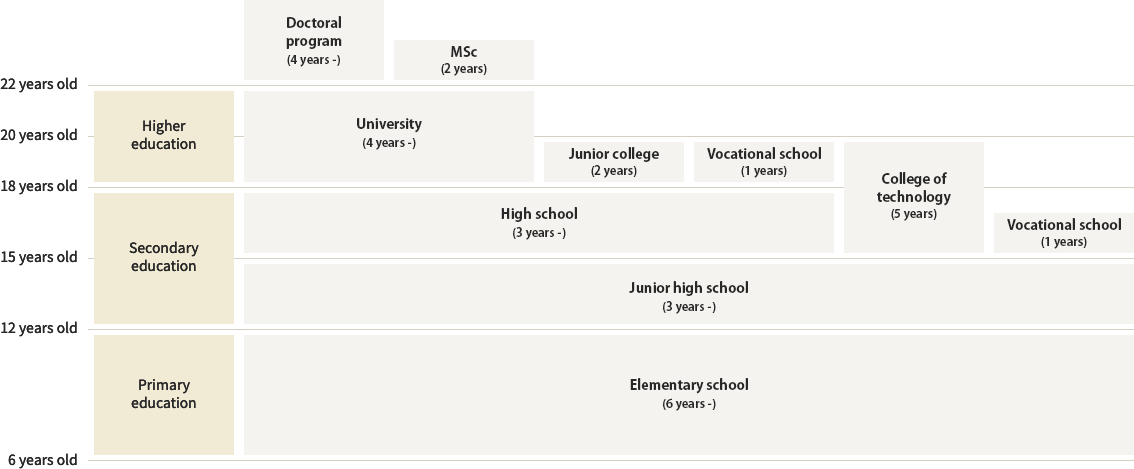
Introduction to Schools in Japan
Event school timetable.
Public schools in Japan have classes five days a week, from Monday to Friday. There are also schools that have classes on Saturday. In junior high and high schools, there are six class periods each day, typically lasting 50 minutes for each. After classes, students clean the classrooms in shifts and then start their club activities. There are a variety of clubs such as cultural and sports ones.
An Example of School Timetable

event Academic Calendar
In principle, the school year begins in April and ends in March of the following year. Most schools adopt a three-semester system, with the first semester from April to August, the second semester from September to December, and the third semester from January to March. There is also a summer break (from the end of July to the end of August), a winter break (from the end of December to the beginning of January), and a spring break (from the end of March to the beginning of April).
An Example of Academic Calendar
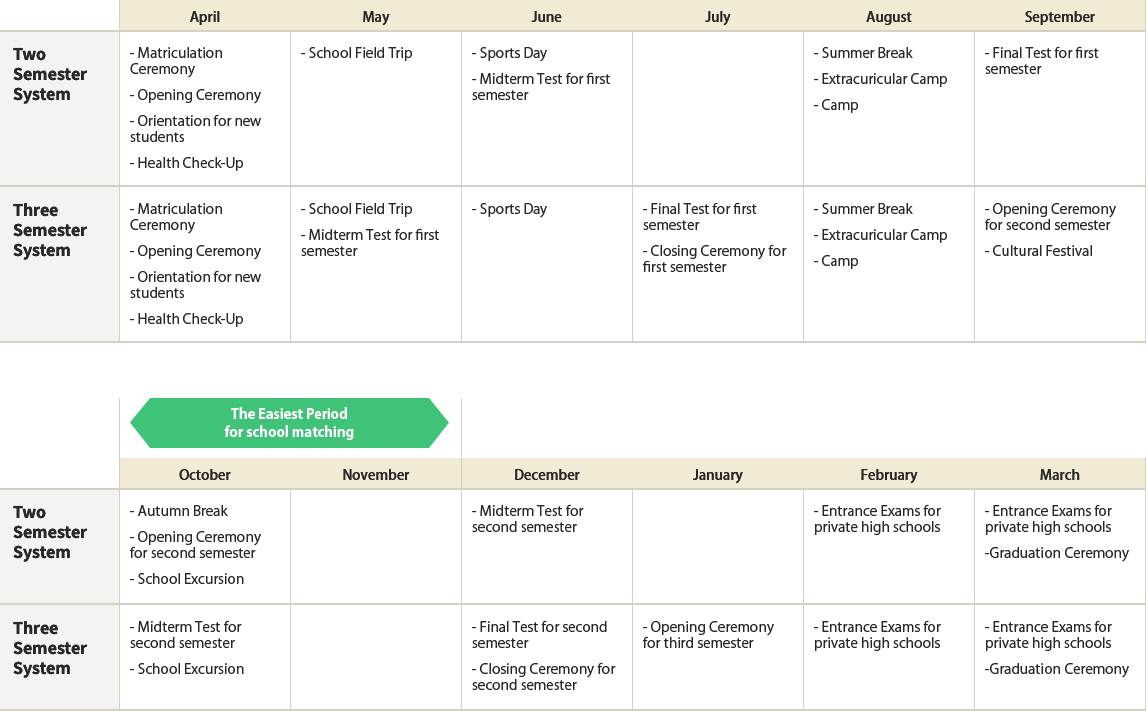
event School Organization
Each school has a principal, a vice principal, teachers, a school nurse, and other administration staff. As the chief executive, the principal assumes all responsibilities of the school, including the courses provided and related administrative work. The vice principal supports the principal to manage administrative affairs of the school and to be in charge of student’s educational activities and curriculum as well. Furthermore, in order to ensure school’s smooth operation, teachers take on various responsibilities, such as taking care of educational activities, students’school life, and employment guidance for students after graduation. Many schools also establish their own committees, for example a International Exchange Promotion Committee, and others.
Related Information

Special Features of Japanese Education
About Features of Japanese Education.
event Regarding the Level of Education
The level of Japanese education is high even by world standards. In OECD’s Programme for International Student Assessment (PISA) aimed at fifteen-year-olds, Japanese students recorded high levels of achievement, particularly in science related areas. Educational activities outside of school also flourish, and programs leading to advanced education are implemented. Enrollment in high schools, the second-half of secondary education, reaches over 90%, and the enrollments in college are also high reaching over 50%. Admission to high schools and colleges is mainly through entrance exams, held from January to March. Source: OECD
location_city Foreign Language Education
English is a compulsory subject in junior high and high schools. There are also elementary schools that introduce English education from intermediate grade classes. In some high schools, apart from English, students are also allowed to take courses in Chinese, Korean, French, German, etc.
location_city Student Clubs
Student clubs are a characteristic part in Japan’s school education. Under teachers’ guidance, students with the same interests in sports, cultural activities, or fields of study voluntarily gather together after classes and on days off. There are also numerous student clubs revolving around Japanese traditional sports and culture, such as judo, kendo(Japanese swordsmanship), sado (Japanese tea ceremony), kado (Japanese flower arrangement), shodo (Japanese calligraphy), etc. Club activities also provide students with the chance to participate in school exchange and friendly matches.
Sports Clubs
- Track and Field
- Kendo (Japanese swordsmanship)
Culture Clubs
- School Band
- School Choir
- Kado (Japanese flower arrangement)
- Sado (Japanese tea ceremony)
- Shodo (Japanese calligraphy)
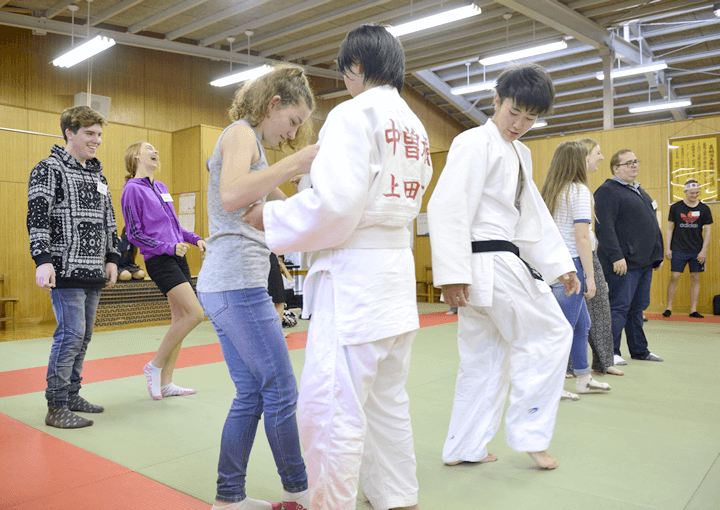
check 学校交流する場合のポイント
Check_box 1~3月は受験シーズンのため交流は難しい.
海外における教育旅行は、それぞれの国・地域によって特徴が異なると考えられるが、日本で現在受け入れている教育旅行は、日本の修学旅行のように、教師等の引率者と児童生徒で構成される団体旅行として実施されることが多い。
check_box 英語での交流が可能
Check_box 部活動も充実, stories of school exchanges.
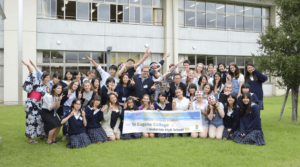
Learn About School Life in Japan
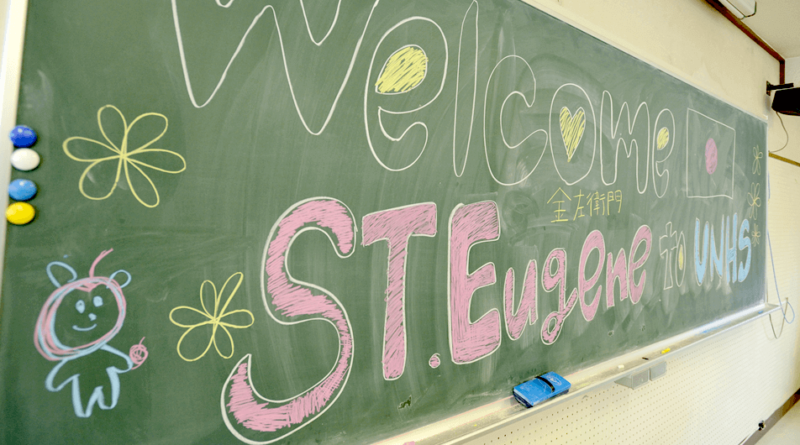
Spring semester 2024: Major alumni activities in Japan
Including an upcoming international symposium with a hybrid format on may 9..
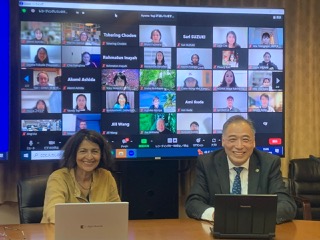
The Japan-based alumni of the International and Comparative Education (ICEd) program initiated this semester three conferences on the occasion of Professor Gita Steiner-Khamsi’s six-week visit to Japan. The visit was made possible by alum Professor Keiichi Ogawa (PhD, 1999), who hosted her sabbatical visit and secured funding from the Japan Society for the Promotion of Science. Professor Ogawa is a Professor and Department Chair at Kobe University’s Graduate School for International Cooperation Studies, an award-winning author of eight books, a member of the Governing Board of the UNESCO International Institute for International Planning (IIEP) in Paris, and an honorary professor in several countries. He has substantially contributed to the growth of the field of international and comparative education in Japan, Southeast Asia, and East Asia. In addition to sharing research, the three events served as a platform to meet up with other alumni based in Japan and internationally.
The first event was on April 12, 2024, and was held in person at the University of Tokyo. It was organized by Professor Yuto Kitamura, with the support of TC-ICEd alum Kazuaki Iwabuchi (PhD, 2022), Assistant Professor, and Dr. Leyla Radjai, University of Tokyo. The presentation of Professor Steiner-Khamsi was held at the Center for School Education and Evidence-based Research (CASEER), University of Tokyo; over seventy researchers attended the event.
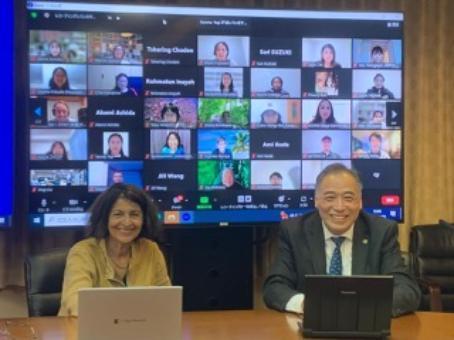
Professor Steiner-Khamsi (left) with Professor Keiichi Ogawa (right)
The second event was a hybrid event, held on April 18, 2024. Professor Keiichi Ogawa organized it in collaboration with the Kansai Branch of the Japan Society for International Development (JASID). The hybrid event attracted over 120 researchers from Japan and the South Asian region. Professor Steiner-Khamsi spoke on the topic “ Making externally funded reforms stick: Challenges and approaches of international cooperation .” The picture shows the organizer of the event (Keiichi Ogawa, Professor/Department Chair, Kobe University) and the keynote speaker (Gita Steiner-Khamsi, Professor, ICEd) in the foreground and a few researchers participating online.
Finally, the third event of May 9, 2024 , 10:00 – 12:00 Japan Standard Time, is an international symposium hosted by Professor Keiichi Ogawa and held at Kobe University’s Graduate School of International Cooperation Studies (GSICS) in a hybrid format. It will be a large event, co-organized with KIX EMAP (funded by IDRC/GPE) and co-sponsored by numerous universities, ministries of education, and think tanks in the United States, Canada, Central Asia, Southeast Asia, and the Pacific region. The speakers are Professors Gita Steiner-Khamsi, TC-ICEd, Rie Kijima , University of Toronto, and Patricia Bromley , Stanford University. The symposium will also feature a panel with the following distinguished speakers: TC-ICEd alum Professor Yume Shinobu Yamaguchi , Director, UN University in Tokyo (PhD, 1999), Professor Kazuo Kuroda , Waseda University and Vice-President of CIES, Dr. Sam Sideth Dy , Cambodia Ministry of Education, Youth and Sport, Dr. Hamoud Al-Seyani , Yemeni Ministry of Education, and Dr. Harry Patrinos , Senior Advisor, World Bank. TC-ICEd alum Dr. Arushi Terway (Ed.D., 2016), NORRAG, will welcome the participants on behalf of the Knowledge and Innovation Exchange Initiative (KIX) EMAP region and moderate the discussion sessions.
Please find more information on the event, including a link for online registration here . Simultaneous translation into Arabic, Russian, and Khmer will be provided.
Tags: International Education International Education
Programs: Comparative and International Education International Educational Development
Departments: International & Transcultural Studies
Published Monday, Apr 22, 2024
Program Director : Garnett Russell, Associate Professor of International & Comparative Education
Teachers College, Columbia University 374 Grace Dodge Hall
Contact Person: Michelle Guo, Program Assistant
Phone: 212-678-3184 Fax: 212-678-8237
Email: iceinfo@tc.columbia.edu
Trending News
Related Practices & Jurisdictions
- Financial Institutions & Banking
- Real Estate
- Administrative & Regulatory

Financial Services Agency of Japan (FSA) proposed amendments to its supervisory guidelines applicable to managers of investment trust ( toshin ) funds and real estate funds, and is currently accepting comments until May 13. Of those, amendments relating to real estate funds would require managers to take additional measures to manage transactional conflicts of interest, specifically:
- Implement property due diligence processes and keep proper records as part of the existing measures required to ensure the appropriateness of due diligence;
- Implement systems to avoid inappropriate influence over service providers, e.g., appraisers, to ensure their independence; and
- Document internal considerations and keep meeting minutes with parties of potential conflicts of interest transactions, which would allow periodical assessment of such transactions.
These amendments came after the recent enforcement action against a J-REIT manager who was found to have violated the duty of loyalty due to its significantly ineffective conflict of interest management system and having acted against the interests of the fund, which resulted in a suspension and business improvement order. The manager was found to have, when purchasing several properties from its affiliate for the fund, had the appraiser raise appraisal values to exceed the prices desired by the affiliate while keeping the appraisal fees lower than other appraiser candidates to create apparent justification to hire the compromised appraiser.
These amendments, which could be adopted in the next month, would apply to all managers registered in Japan managing public or private real estate funds (onshore or offshore).
While the proposed additional measures are, in practice, consistent with existing practices among many sophisticated real estate fund managers, managers should consider taking this opportunity to revisit their conflicts of interest policies, procedures and implementations thereof, as well as fund terms and disclosures in offering documents, to ensure that these measures are addressed, implemented, and represented in a manner consistent with the amendments.
Current Legal Analysis
More from k&l gates, upcoming legal education events.
Sign Up for e-NewsBulletins
Educational Law in Japan
- First Online: 09 May 2024
Cite this chapter

- Koju Sasaki 3
In Japan the rule of law as a modern nation was begun by the Meiji Restoration, since then the educational legal system related has being transformed and developed in the influence of political, economic, and international environment peculiar to Japan. After World War II, under the occupation policy by the General Headquarters of the Allied Forces (mainly United States of America), new democratic policies were implemented. And after the restoration of independence from the General Headquarters, the centralized educational legislation was back. From the 1950s administrative bureaucrats had power to lead the development of educational legislation during the period of political stability. At the beginning of twenty-first century, administrative and financial reforms occurred designed to decentralization and deregulation of the central government, the policy was triggered by the first full-scale change of government by the Democratic Party. Since 2012, under the administration led by the Liberal Democratic Part, legislation to respond to educational issues and to realize the conventions on education has been put in place.
This is a preview of subscription content, log in via an institution to check access.
Access this chapter
- Available as PDF
- Read on any device
- Instant download
- Own it forever
- Available as EPUB and PDF
- Durable hardcover edition
- Dispatched in 3 to 5 business days
- Free shipping worldwide - see info
Tax calculation will be finalised at checkout
Purchases are for personal use only
Institutional subscriptions
Kaneko M (1978) Educational law, New ed. Yuhikaku, Tokyo
Google Scholar
Sasaki K (2009) The revised fundamental law of education: the enactment process and issues of government interpretation. Nihonbunkyoshuppan, Tokyo
Sasaki K (2022) Educational trial casebook. Gakubunsha, Tokyo
Sasaki K (2023) School legal practice. Jidaisha, Tokyo
Tanaka K (1961) Theory of the fundamental law of education. Yuhikaku, Tokyo
Download references
Author information
Authors and affiliations.
Tokyo Gakugei University, Koganei, Tokyo, Japan
Koju Sasaki
You can also search for this author in PubMed Google Scholar
Corresponding author
Correspondence to Koju Sasaki .
Editor information
Editors and affiliations.
University of Dayton, Dayton, OH, USA
Charles J. Russo
The China National Academy of Educational Sciences, Beijing, China
Rights and permissions
Reprints and permissions
Copyright information
© 2024 Educational Science Publishing House Limited
About this chapter
Sasaki, K. (2024). Educational Law in Japan. In: Russo, C.J., Ma, L. (eds) A Comparative Analysis of Systems of Education Law. Springer, Singapore. https://doi.org/10.1007/978-981-97-1052-2_8
Download citation
DOI : https://doi.org/10.1007/978-981-97-1052-2_8
Published : 09 May 2024
Publisher Name : Springer, Singapore
Print ISBN : 978-981-97-1051-5
Online ISBN : 978-981-97-1052-2
eBook Packages : Education Education (R0)
Share this chapter
Anyone you share the following link with will be able to read this content:
Sorry, a shareable link is not currently available for this article.
Provided by the Springer Nature SharedIt content-sharing initiative
- Publish with us
Policies and ethics
- Find a journal
- Track your research
Exploring The Perception Of Virtue In Japan:
April 11, 2024
Rebellion Research
In a groundbreaking study published in Frontiers in Psychology , Japanese researchers Dr. Koji Tachibana and Dr. Eisuke Nakazawa of Chiba University shed light on the varying perceptions of virtue among educational specialists and the general public in Japan. This research has significant implications for academic integrity and educational policy.
Historically, virtue, a set of moral and social codes, was viewed as an aspirational excellence in the West, while in the East, it was seen as a goal for select individuals, such as rulers. The 20th century witnessed a resurgence of the concept in academic circles, yet it remained less prevalent in the public consciousness.
The study, conducted through an online survey targeting individuals from various age groups, genders, and professions, explored how frequently the term “virtue” is encountered in daily life, the associated impressions and words, and which virtues are considered important or challenging to understand.
Significantly, the study found that educational specialists (ESs) were more familiar with the term “virtue” and tended to associate it with intellectual virtues, drawing heavily on ancient Greek philosophy. The general public (GP), on the other hand, identified more with passive, emotional virtues, often aligning with Eastern values. Both groups, however, demonstrated a mutual lack of understanding of Confucian virtues.
Dr. Tachibana emphasizes the importance of this research, noting, “The gap in understanding virtue between the GP and ESs could lead to errors in educational resources and hinder the effective design of an education system.”
The study’s conclusions highlight the different emphases on virtues between the two groups, with the GP leaning towards Eastern values and ESs towards Western ones. This discrepancy suggests a potential gap in understanding that could have adverse practical implications, particularly since ESs play a pivotal role in shaping the national curriculum, educational policies, and textbooks.
In his closing remarks, Dr. Tachibana points out, “Our findings reveal significant social implications in areas such as academic integrity and educational policy, showing how differently virtue is understood by ESs and the GP in Japan.”
This research is a critical step in addressing these gaps and could pave the way for future studies on the concept of virtue in society, underscoring its importance in shaping educational approaches and public understanding.
Click on the citation to read the original post:
Rebellion Research. (2024, April 11). Exploring the perception of virtue in Japan: A study highlighting differences between educational specialists and the general public. Rebellion Research. Retrieved from https://www.rebellionresearch.com/exploring-the-perception-of-virtue-in-japan-a-study-highlighting-differences-between-educational-specialists-and-the-general-public
Explore the Center for Practical Wisdom
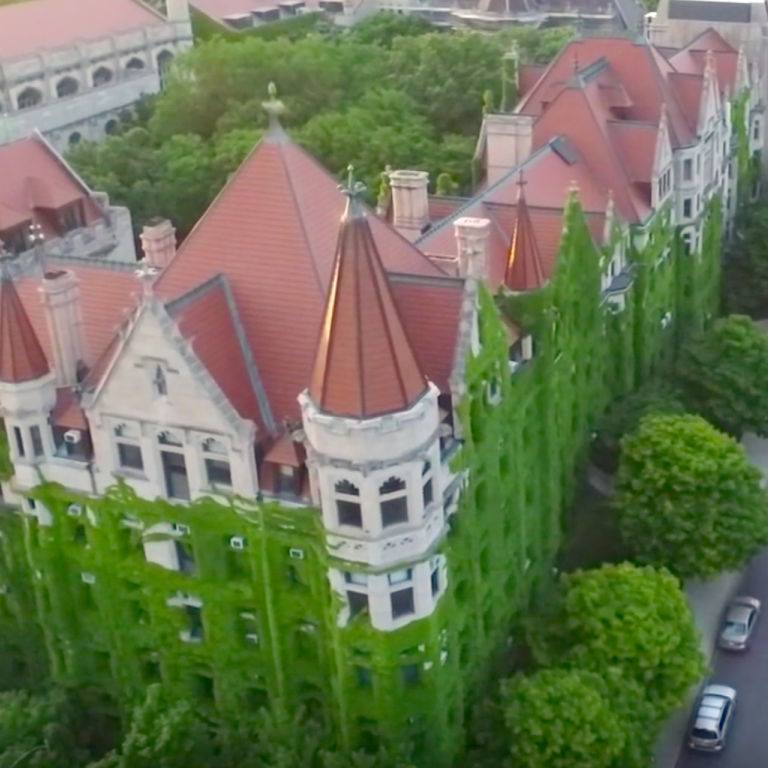

IMAGES
VIDEO
COMMENTS
Introduction. The Legal Training and Research Institute was established in May 1947 under the provision of Article 14 of the Court Act (Act No. 59 of 1947) as a training facility affiliated to the Supreme Court of Japan. The institute is in charge of the research and the training of judges, and the judicial training of legal apprentices.
Legal education is the education of individuals in the principles, practices, and theory of law. It may be undertaken for several reasons, ... Japan. The Japanese Ministry of Justice opened the University of Tokyo Faculty of Law in 1877 (changed to Imperial University in 1886). To matriculate to the University of Tokyo, students had to finish ...
The Japanese government and law schools have just begun to re-renovate legal education, giving priority to three challenges: (1) offering continuous legal-education programmes for practitioners; (2) enhancing community service and supporting career development of graduates in the new legal service area; and (3) internationalization.
Therefore, Japan's widely supported self-help principle in its promotion of local human recourses via Japanese legal education echoes its own experience in incorporating foreign law. 40 In other words, the central mission of Japanese legal education assistance in Asia is to train legal scholars and practitioners who will undertake local law ...
Waseda University - School of Law - Official Site A general introduction of our educational principles, research, curriculum, facility and academic staff profiles, as well as various information on entrance examinations, continuing education, job search resources, etc. for examinees, current students, and alumni.
In this context, the Recommendations of the Justice System Reform Council issued in 2001 suggested a drastic reform of the legal professional education system, featuring a "training process" which organically coordinates legal education, the bar examination, and judicial training. In April 2004, the new legal professional training system ...
Why the Japanese Law School System Was Established 367 American-style law schools were opened between 2004 and 2005. This reflects a massive shift in legal education from undergraduate law faculties [hougakubu] to graduate-level professional law schools [houka daigakuin]. Since
E-mail: [email protected]. initiated, in the early 1990s, knowledge-based assistance projects in Asia with regard to establishing a well-functioning legal system that would promote a fair market economy, the rule of law and democracy. Within the last three decades, Japan has elaborated its unique philosophy of legal cooperation in Asia ...
Masako Kamiya, "Structural and Institutional Arrangements of Legal Education: Japan" (2006) 24 Wis. Int'l L. J. 153; Google Scholar Mayumi Saegusa, "Why the Japanese Law School System Was Established: Co-optation as a Defensive Tactic in the Face of Global Pressures" (2009) 34 Law & Soc. Inquiry 365, 366.
clinical legal education (CLE) in Japan since its adoption in 2004 as well as sev-eral examples of law school clinics. Finally, it explores avenues for improvement and growth. The Japanese Legal Education System—Generally Historical Perspective up until Major Reforms in 2004 After World War II, Japan implemented a three-pronged legal ...
Japan's situation regarding Bilingual Legal Education (BLE) is, at least in the National Reporter's point of view, quite original because of its complexities and somehow contradictions. To begin with, two different stages must be taken into account: before and after 2004. That year was a key one to introduce and develop a new educational ...
the Japanese postwar legal education system that policymakers sought to reform. These characteristics can be grouped under three key concepts: popularization of legal education, legal edu-cation's dissociation with a specific legal career path, and lack of professional education within the legal education curriculum.
Japanese Legal Education in the offices of a criminal court judge, a civil court judge, a private practitioner, and a public procurator. Student apprentices spend four months in each office. Unlike the American law school's focus on parties to litigation, in Japan draftsmanship is considered the "most effective tool for developing legal minds and
Legal Education Issues Loom in US and Japan. By Andrew Cohen. At a time when many countries are scrutinizing the role of legal education, Berkeley Law and one of its global partners convened to discuss emerging issues in the United States and Japan. The December 2013 Sho Sato Conference built on a longtime collaboration between the law school ...
6 Journal of Legal Education 2005.10 As of 1997, Japan had about 20,000 lawyers, compared with 941,000 in the United States, 83,000 in the United Kingsom, 111,000 in Germany and 36,000 in France. The ratio of lawyer to population was 1 to 6,300 in Japan, 1
Legal Education in Japan changed generally over time due to its failure to produce new lawyers. The first legal education model used was based on Western legal education, specifically German, French, and American law, due to Japan's westernization at that time. This model continued to develop throughout the years and was used as Japan's legal ...
Legal Education. In the early 2000s, Japan realized that more attorneys were needed to support the growing regulatory state and increased transnational business. The Justice System Reform Council of Japan published a set of recommendations to modernize legal education. Prior to the reform, the study of law was a four-year undergraduate degree ...
The legal community in Japan is currently in the midst of a debate over how to reform legal education. A major issue of the proposed reform is whether we should adopt an American model law school, i.e., professional education at the graduate level, while essentially doing away with the traditional Japanese method of teaching law at university.
First, there is some existing literature on law-related education or "legal education" 7 in Japan. For instance, Eguchi (1993 , 1998 , 2001 ) has explored law-related education, focusing on how the study of law-related education in the United States could be imported into Japan.
Law-related education aims to enable citizens who are not legal professionals to understand laws, the judicial system, and the values that underlie them. ... 1-1-1 Kasumigaseki,Chiyoda-ku,Tokyo 100-8977,Japan TEL:+81-(0)3-3580-4111
The Japanese school system primarily consists of six-year elementary schools, three-year junior high schools and three-year high schools, followed by a two-or-three-year junior colleges or a four-year colleges. Compulsory education lasts for 9 years through elementary and junior high school. School exchanges during Japan Educational Travel are ...
Courts in Japan (PDF:1.31 MB) Table of Contents. Constitution of Japan; Supreme Court; Courts other than the Supreme Court (Lower Courts) Judicial Proceedings; ... The Legal Training and Research Institute of Japan; Supreme Court of Japan 4-2 Hayabusa-cho, Chiyoda-ku, Tokyo 102-8651 JAPAN
This chapter provides a brief description of Japan's education system and the context in which it operates. Since the 1990s, the Japanese economy has been sluggish, and the ratio of debt to GDP has reached uncharted territory. The forecast of sharp demographic decline, the rapidly ageing population and the evolution of the skills required to flourish in a knowledge economy also present new ...
This research article on the concrete example of Nagoya University will focus on Japan's legal education assistance initiative to foster human resources in Asian countries of Uzbekistan, Mongolia, Vietnam, Cambodia, Myanmar and Laos. By focusing on educational projects of Nagoya University, which many refer to as the Asian hub for legal ...
The Japan-based alumni of the International and Comparative Education (ICEd) program initiated this semester three conferences on the occasion of Professor Gita Steiner-Khamsi's six-week visit to Japan. The visit was made possible by alum Professor Keiichi Ogawa (PhD, 1999), who hosted her ...
Financial Services Agency of Japan FSA proposes amendments to supervisory guidelines for managers of investment trust funds and real ... Upcoming Legal Education Events. Jun. 12. 2024. REACH 30/30 ...
In Japanese education law, the relationship between the state and education has always been a major theme since the end of World War II. ... it can be said that in the accumulation of various laws of the postwar education law, the three legal systems for guaranteeing the right to learning have been formed in a multilayered manner (Sasaki 2023).
Rebellion Research. In a groundbreaking study published in Frontiers in Psychology, Japanese researchers Dr. Koji Tachibana and Dr. Eisuke Nakazawa of Chiba University shed light on the varying perceptions of virtue among educational specialists and the general public in Japan. This research has significant implications for academic integrity and educational policy.